Listen:
Scroll down for a transcript, video, how to subscribe, and more
Episode Synopsis:
Welcome to Episode #63 of Habitual Excellence, presented by Value Capture.
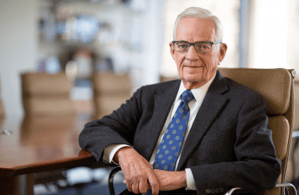
Today brings us a special episode, where we have an opportunity to revisit Mark Graban's interview of our original non-executive chairman, Paul H. O'Neill, Sr. This interview originally appeared in the Lean Blog Interviews podcast back in July 2011.
In the discussion, Mr. O'Neill shared his thoughts on patient safety and healthcare, including his time spent as the Chair of the Pittsburgh Regional Health Initiative and his work with Dr. Richard Shannon in dramatically reducing hospital-acquired infections (HAIs) to their “theoretical limit” of zero harm. Mr. O'Neill talks about the leadership required to have such an impact on safety and quality, drawing on lessons from his years as Alcoa's CEO.
Click to visit the main Habitual Excellence podcast page.
Quotes:
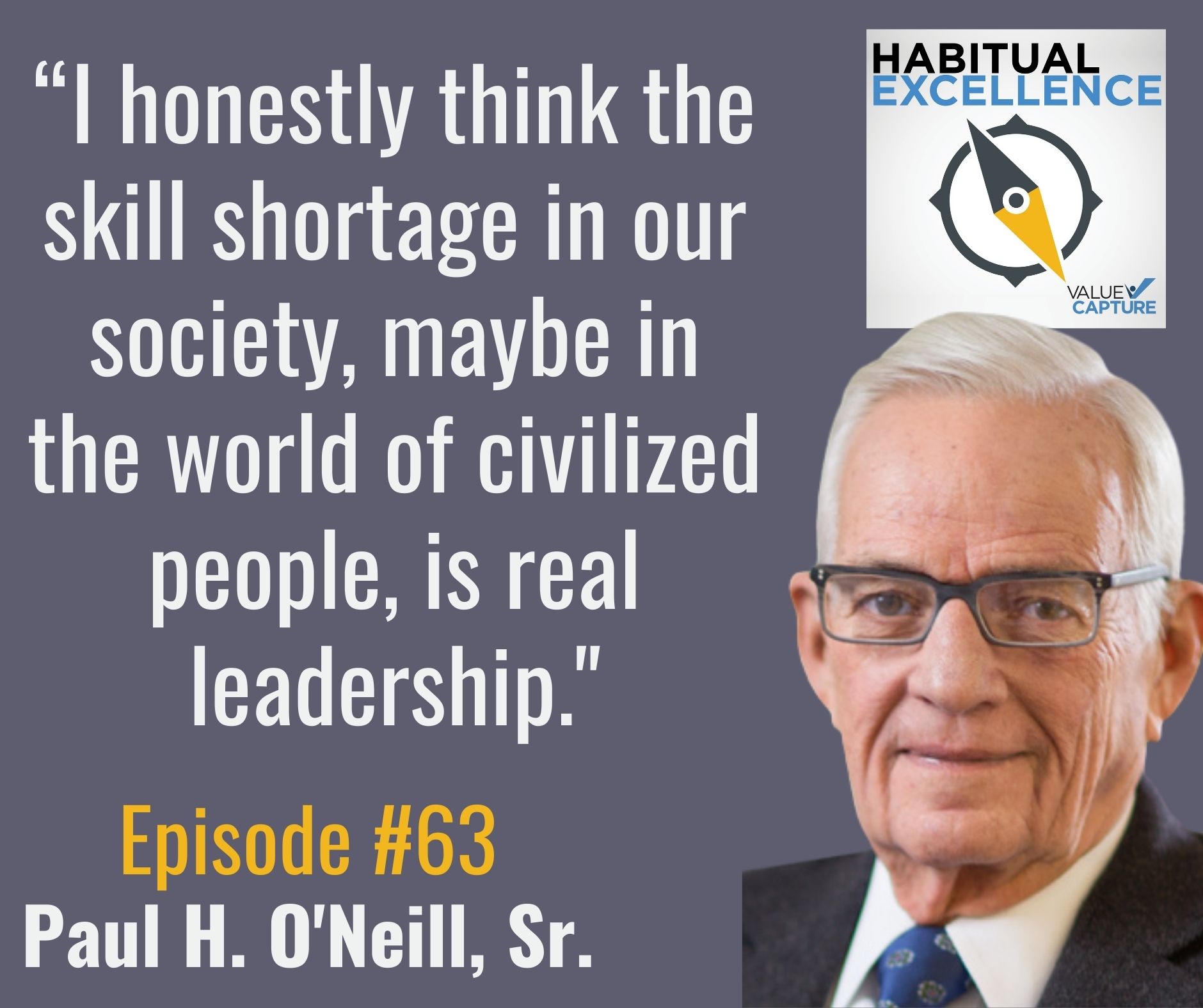
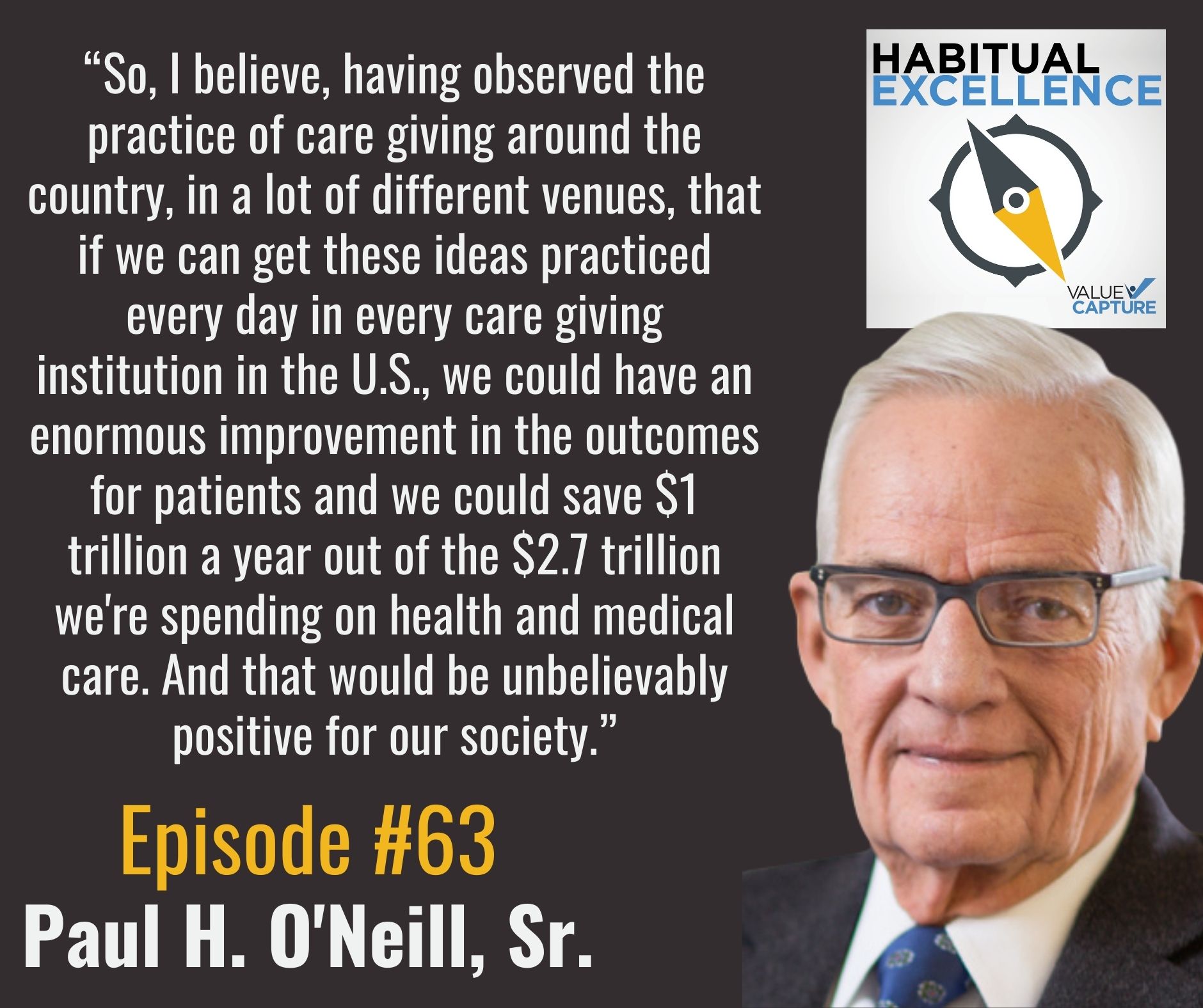
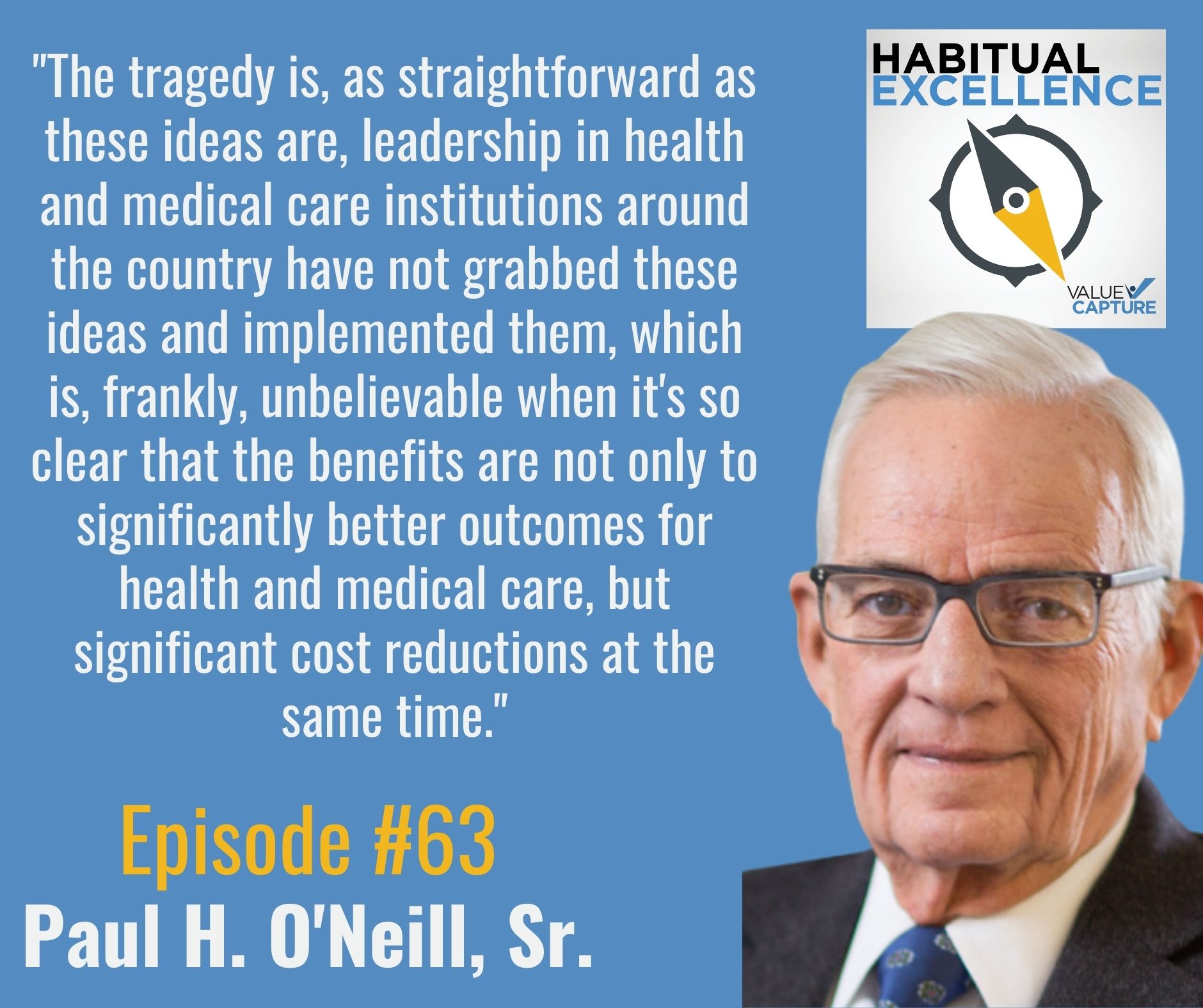
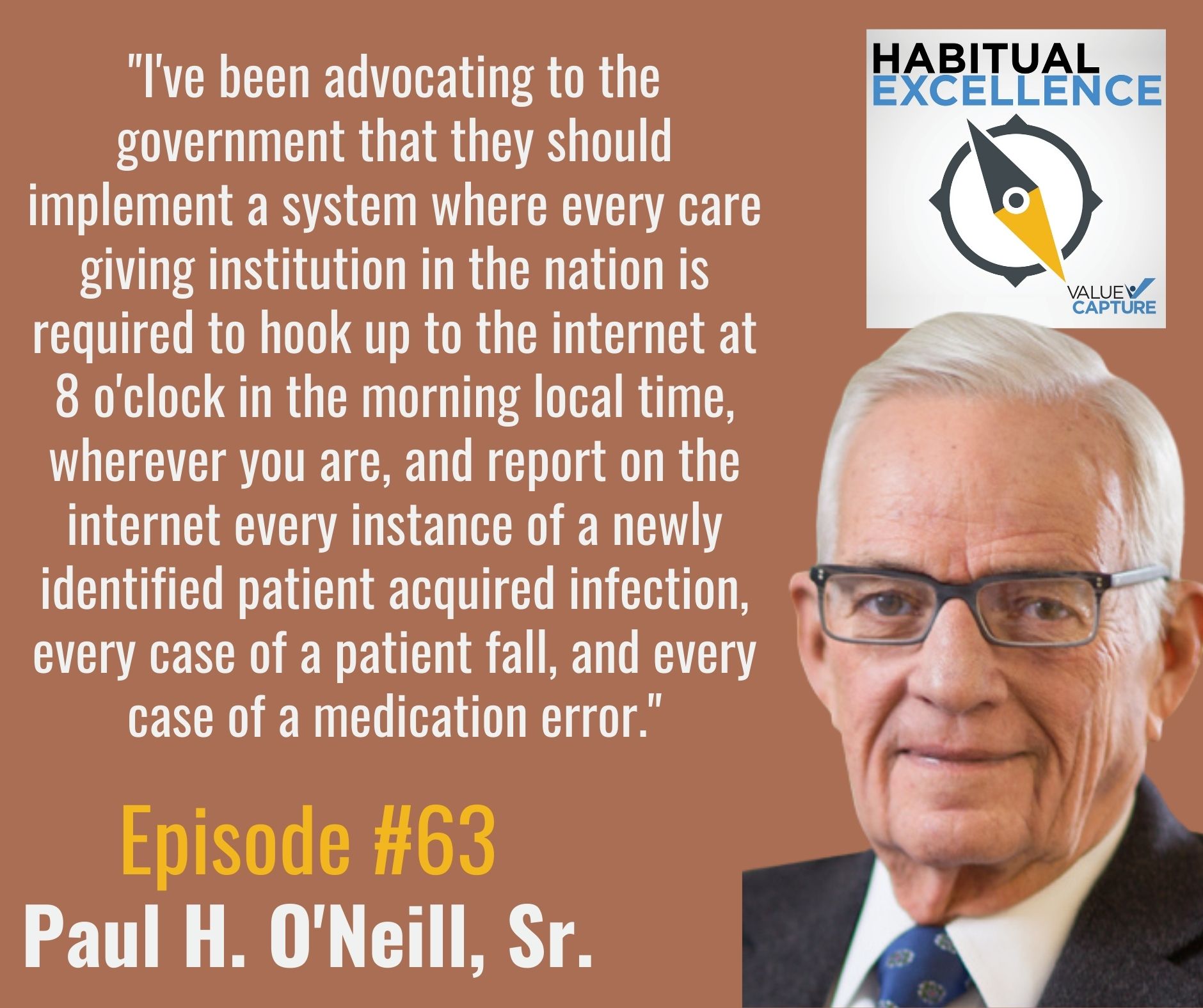
Subscribe:
To make sure you don't miss an episode, be sure to subscribe today! Please rate and review the podcast.
Transcript:
Mark Graban (2s):
Hi, this is Mark Graban from Value Capture. And today I'm sharing an interview that I did with Paul O'Neill, Sr. Back in the summer of 2011. Mr. O'Neill was of course the, the first non-executive chair of Value Capture. And he was in that role up until his passing in early 2020. In, in this episode originally published in my lean blog interviews podcast. We talk about workplace safety. We talk about patient safety and leadership and his thoughts and experiences both as a leader himself, and as somebody who is helping influence other leaders in healthcare at that time, many of those leaders you've heard interviewed in this series.
Mark Graban (48s):
So I hope you enjoy this. Look back this, listen back, everything he shared back then was very much ahead of the curve and very much relevant here in 2022. So again, here's that audio, my interview of Paul O'Neill senior from 2011, to learn more about Value Capture, visit our website www.valuecapturellc.com. Hi, this is Mark Graban. Welcome to episode 1 24 of my podcast for June 20th, 2011. This episode is produced in partnership with the Healthcare Value Network. I have a very special guest today. He is Paul O'Neill.
Mark Graban (1m 27s):
He served as the 72nd Secretary of the US Treasury from 2001 to 2002, and is also very well-known for having served as chairman and CEO of Alcoa from 1987 to 1999. Retiring as chairman at the end of 2000. And in leading Alcoa, they became the safest workplace in the world while also increasing their market cap by more than 800%. And today Alcoa operates across more than 40 countries at a loss workday rate that is 20 times lower than the average rate for American hospitals. Now, Paul O'Neill is currently chairman of Value Capture LLC, where he provides counsel and support to healthcare executives and policy makers who share his conviction at the value of healthcare.
Mark Graban (2m 8s):
Operations can be increased by 50% or more through the pursuit of perfect safety and clinical outcomes. Paul serves as a board member at the national quality forum, the Rand corporation, and more than a dozen other major corporations and nonprofit organizations. So for more information, you can go to leanblog.org/ 124. For past episodes, you can go to www.leanpodcast.org. Thanks for listening, Mr. Neil, thank you for taking time to talk. So my pleasure, I was wonder if you could start by telling us, you know, some of the listeners might not be familiar with your transition from your role as CEO of Alcoa and the great work that was done there on the employee safety front and how that translated into health care.
Mark Graban (2m 58s):
Can you tell the
Paul O'Neill, Sr. (2m 59s):
Listeners about that part of your background? And in fact, I've been interested in helping medical care issues for a very long time. When I first went to work for the federal government in 1961, it was in a position as a management intern at the Veterans Administration. And I was hired specifically to bring and apply ideas of operations research to the variety of things. The Veterans Administration was doing, including insurance programs and compensation and benefit programs.
Paul O'Neill, Sr. (3m 39s):
And of course at that time, delivering health medical care through 212 different VA hospitals around the country. And subsequent to that, I was recruited to go into the, what was then the bureau of the budget and turned into the office of management budget, where I had principal responsibilities in my early days there for advising the director and the president on issues of health and medical care. And this was right after Medicare and Medicaid were enacted. And so I've had a really long engagement involvement with health medical care issues.
Paul O'Neill, Sr. (4m 20s):
And then as you say, I was after I left the government, then my teams early in 1977 became eventually the president of International Paper Company and then the CEO of Alcoa. And I had the different sets of responsibilities for daily, with health and medical care issues. And so I, I've never lost my interest and involvement one way or another in a health medical care issues. And in fact, while I was still the chairman and CEO of Alcoa, 1978, 1997, I was asked to be a co-founder of something called the Pittsburgh Regional Healthcare Initiative.
Paul O'Neill, Sr. (5m 5s):
And I accepted that responsibility because I believed that it was possible as it, as I found that it was possible at Alcoa with an articulation of the right set of values, to help organizations, to accomplish a level of important performance that most people would have said was impossible. And those ideas began was something that I initiated on the day that I went to Alcoa out of my earlier experiences at International Paper and working in the federal government, which was to announced that it should be and would be our goal and our COA to create a workplace, which ultimately turned out to involve 140,000 people in 43 countries to create an understanding and a goal of achieving zero injuries to people who did the work all over the world.
Paul O'Neill, Sr. (6m 21s):
And when I, when I initiated this idea for Alcoa, we were already in the top one third of companies in the United States in terms of avoiding injuries to people and over a period of a few years. In fact, even today, if you were to go on the internet and type in Alcoa and on the upper left-hand corner of their webpage, select the health and safety data bar, you would find that our co was injury rate to people who work for the company around the world is lower by 30 times than the injury rate to people who work in the United States on health, medical care facilities.
Paul O'Neill, Sr. (7m 17s):
And I believe them, and I continue to believe that with the right leadership and, and a characterization of organizational objectives and what I call a theoretical limit, not only is it possible to achieve worker safety and health and medical care, that's 30 times better than it is today, but those same principles of containing of first of all, setting goals at the theoretical limit, which means zero is the number of injuries that occur to occur in a great organization, not only to the workforce, but to, in the case of health, medical care to the patients that are being served.
Paul O'Neill, Sr. (8m 7s):
And so I've been at that for quite a while.
Mark Graban (8m 12s):
Can you talk about some of the early work within, within Pittsburgh, in working with Dr. Richard Shannon and Allegheny General Hospital looking at reducing infections for patients. It sounds like maybe it's human nature of people looking at a goal like zero, whether it was in industry and healthcare and saying that's not possible. Can you talk a little bit about some of the work that that was done there and maybe also touch on the point of how do you have a goal of zero be motivating as opposed to maybe somehow seeming discouraging to people, if that's a goal that they think that can't be reached.
Paul O'Neill, Sr. (8m 50s):
Okay, good. You know, it's worth telling a little bit about how Dr. Richard Shannon came to be interested. I thought when I was at Alcoa, that we should share our expertise in, in achieving remarkable levels of performance with a community. And so we created something called the Alcoa university and the Dr. Shannon came to one of our university sessions and he was so intrigued with the idea of applying ideas of continuous learning and continuous improvement with an established goal at zero injuries to people, to patients that after he went to our university, he set out to import these ideas into his work at the Allegheny Medical Center, where he had a responsibility for three intensive care wards.
Paul O'Neill, Sr. (9m 51s):
And when he began this work the, in the year before they started, they had, I remember 1,754 patients went through the three units. 39 of them got an infection during the process of their care. And 19 of them died. And so Dr. Shannon, I began working with all the people who are involved in the delivery of care to, to observe how they were doing the care and to come to agreement with the people who are delivering the care nurses and doctors and technicians and people who clean the rooms on how they would do work.
Paul O'Neill, Sr. (10m 41s):
And they would all do it the same way every day. So that if there was an infection, they could more easily understand what had caused a person to get an infection. And over, over a period of about 18 months, as they implemented these ideas, they began to make progress. And, and at the end of that 18 month period, they began measuring how they were doing and they keeping track so that in the subsequent measurement period of 12 months, they had over 1,850 patients. That is to say a hundred more patients during the course of a year.
Paul O'Neill, Sr. (11m 23s):
They had one infection instead of 39 and no one died. And, you know, his results were very consistent with my own experience at Alcoa, that one, we got people to practice, good ideas, and to learn from every instance of anything going wrong, that the process, whatever it was got better and better and better. And so even today, you know, I've been out of our going out for 11 and a half years. If you look at their website, they've maintained the safety culture and the, the, the injury rate at Alcoa continues to be 30 times better than the national average in all industries, including health, medical care.
Mark Graban (12m 20s):
And it, that great success from Allegheny is being duplicated by Dr. Shannon. Now that he's in Philadelphia at the University of Pennsylvania, and it's, it's, it's proving repeatable, you know, similar methods that he used through, you know, being promoted as, as checklists by a tool go on day and the world health organization and others. This, this certainly seems eminently repeatable. I be curious to hear your thoughts, Mr. O'Neil on your perspective on the spread of, of these methods and these results through healthcare. It seems like if this has been, you know, so well-proven, and the, and the re the results are so dramatic that you would hope everybody would, would rush to try to duplicate those results in their own organization.
Mark Graban (13m 10s):
I'm, I'm, I'm curious what your thoughts are on the pace of, of the spread of these ideas and methods.
Paul O'Neill, Sr. (13m 18s):
I think you probably know, in the last six months or so that I've got a couple of studies done, one at North Carolina and another sponsored by the centers for Medicare and Medicaid. And what they've concluded is that since 1999, when the Institute of medicine famous study was published called two errors, human we've accomplished practice on a national basis, practically nothing in terms of reducing things gone wrong in the delivery of health and medical care.
Paul O'Neill, Sr. (13m 59s):
It's true. As you say that Dr. Shannon approved the case in Pittsburgh, he's proving it again at the University of Pennsylvania and Philadelphia and the ThedaCare medical system in Wisconsin is producing the same kind of results. Gary Kaplan at the Virginia Mason Clinic in Seattle, Washington is producing similar reports, and there are a few other places around the country, but the tragedy is as straightforward as these ideas are leadership and health and medical care institutions around the country have not grabbed these ideas and implement them, which is frankly unbelievable when it's so clear that the benefits are not only to significantly better outcomes for health medical care, but significant cost reductions at the same time.
Paul O'Neill, Sr. (15m 13s):
Right? So I, I believe having observed the practice of caregiving around the country and a lot of different venues that if we could get these ideas practiced every day and every caregiving institution in the United States, we could have an enormous improvement in outcomes for patients. And we could save a trillion dollars a year out of the current $2.7 trillion we're spending on health and medical care, and that would be unbelievably positive for our society.
Paul O'Neill, Sr. (15m 53s):
So what do you think is getting in the way of the more rapid adoption of these methods? And if the benefits are so clear, you know, I, I, I honestly think the greatest skill shortage in our society may, maybe in the world of civilized people is real leadership. There are a whole lot of people who I suppose are leaders by designation, but I don't honestly know a lot of people who are leaders in the sense that they will articulate goals at what I call the theoretical limit, and then help their people to acquire and practice the skills that are necessary to what I call habitual excellence.
Paul O'Neill, Sr. (16m 47s):
You know, if you look around the health medical care environment in the United States, you can find endless examples of projects where people have worked on some small part of the opportunity, but it's really hard to find people in leadership positions who understand the idea of habitual excellence, which means everything should be a leader should expect every aspect of his organization to perform at the known level of possibility.
Paul O'Neill, Sr. (17m 30s):
And, you know, having that kind of leadership and a leadership that is not about punishing or blaming people, but about using every single instance of anything gone wrong as a basis for organizational learning is really critical to this. And, you know, there are a lot of different people working on them, pieces of these ideas. Unfortunately, there isn't a national movement yet. Hopefully soon there will be.
Mark Graban (18m 5s):
I think you're right. There are certainly leaders and organizations who are trying to help move away from that, that shame and blame culture, John Toussaint and ThedaCare and his successor Dean Gruner as CEO. I know they're certainly trying to make that a part of their culture, Gary Kaplan, as you mentioned, trying to create environments where people can raise issues and flagged near misses and use that to drive improvement in organizational learning. It's interesting. Maybe I can get your thoughts looking at a higher level aspect of this. I saw an interview read an interview where you, you talked about the idea of medical malpractice and how that structure may be a, at a real high level interferes with healthcare improvement.
Mark Graban (18m 56s):
Many, I think even advocated eliminating medical malpractice. So I was wondering if you could share, you know, elaborate on that or share some thoughts and, and tie that back to the impact on really improving patient safety and quality.
Paul O'Neill, Sr. (19m 10s):
As, as I go around and talk to people about aspiring to habitual axons, one of the pushback that I get well, that there are several, one place backward you alluded to earlier is for people to say, well, we can never be perfect and we don't want to set goals. We can't achieve, you know, and I found in my own early days of Alcoa, when people told me that about work by safety, I set them up. Okay. If you don't want to have a goal of zero, then let's go around and find out who wants to volunteer to be hurt, to make sure we reach our goal of somebody being hurt, you know? And, and it's so ridiculous on it's face it's equivalent to people saying, oh, I, you know, there's no way that we can eliminate all the infections on the hospital.
Paul O'Neill, Sr. (19m 55s):
It's a lie. You know, it, it is simply not true. And, and to aspire to less than zero is to excuse every single one that happens rather than learning from them and figuring out a way to introduce practices that will take away the possibility. So in the, in the secondary case of medical malpractice, people say, oh my God, if we start reporting things gone wrong, w we're creating a roadmap for the lawyers to come and attack us with our own information. So I believe there is a legitimate answer to that. And, and it rested in this observation, do you around the country, and you trying to find people who are malevolent, malefactors, who are intentionally hurting people, I would submit to you except with criminally people.
Paul O'Neill, Sr. (20m 48s):
You can't find any examples of that now, is it true that people do get hurt? And, and, and in the, in the, in the practice of medicine in the United States, the answer is, yes. All right. So we need to combine, combine that observation when people do get hurt with the idea that the way to avoid people getting hurt by the same circuit set of circumstances over and over again, is to learn from everything gone wrong. And in order to do that, we need to have a transparent system where everything gone wrong is observed, documented and shared on a real-time basis every day in every healthcare giving institution.
Paul O'Neill, Sr. (21m 31s):
And in order to take away the excuse that they can't have transparency because of the threat of lawsuits we should abandon what was already a bad notion of medical malpractice and in its place, create a system where when an individual is injured as a consequence of a medical intervention, we simply turn the case over to a board of experts to judge the economic loss associated with the injury and award that individual, that economic loss, without any lawyers involved and without any trying to hide the fact that an individual was injured so that we can insist on transparency.
Paul O'Neill, Sr. (22m 22s):
And there won't be an economic cost associated to the individual events. And I believe that this is sufficiently worthy, that we had to pay for out of a general revenues stream of the federal government. And I would be willing to accept a step back from that, with the health and medical care system, producing a standby fund to service the economic cost of things going wrong. And I honestly believe in a fairly short period of time, the costs would be sufficiently insignificant. It wouldn't matter
Mark Graban (23m 1s):
Th the idea being that, that approach to compensating, those who are wronged, but also driving improvement would help prevent future cases of harm and reduce costs in, in the future in a far more effective way than the current system.
Paul O'Neill, Sr. (23m 17s):
That's exactly right. Any, in fact, I've been advocating to the government that they should implement a system where every caregiving institution in the nation is required to hook up to the internet at eight o'clock in the morning, local time, wherever you are, and report on the internet. Every instance of a newly identified patient acquired every case of a patient fall and every case of a medication air. And I think the availability of that data, first of all, would be shocking to the people.
Paul O'Neill, Sr. (24m 0s):
And secondly, I think it would spur action to bring the numbers down quickly. So right now, by best estimates, there are 300 million medication errors in this country every day. So if you can imagine, if we could cause people to report medication errors on a 24 hour cycle basis, we would have on average, 800,000 reports of medication errors every day, which is the truth, and which I believe would cause the caregiving institutions to put their shoulder to the wheel of continuous learning and continuous improvement.
Paul O'Neill, Sr. (24m 46s):
And we would stop this madness.
Mark Graban (24m 50s):
Well, I I'm really, I'm very appreciative for your leadership on this important issue. Mr. O'Neill, as a, as a final to wrap things up. If you can tell the listeners a little bit about the work that you're still doing through the Value Capture organization, and if you have any final thoughts to share with the listeners, maybe they try to either inspire change in their own healthcare organization, or as a general public, what we can do to help inspire more quality and patient safety.
Paul O'Neill, Sr. (25m 21s):
I have an organization that's called the Value Capture, and it is dedicated to these propositions I've been talking about, and they're working in a variety of different medical care institutions settings around the country. And they're also working these days with the Institute of Medicine coming up on, I think August the 23rd, we have a session in Washington at the Institute of Medicine to bring together leaders in the field to talk about creating what I call Bulletproof documentation of the size of the patient improvement and cost saving potential across the nation.
Paul O'Neill, Sr. (26m 12s):
And so, you know, we're, we're continuing to work on these ideas. I'm also involved with a number of other institutions, including feta care, which I mentioned and Wisconsin, because John Toussaint has a demonstrated. He not only believes in these ideas, he brought them into practice and his successor is continuing to work in Wisconsin. You know, one hope I would have is that the Congressman him, his state who's become fairly famous for advocating financial medicine for health and medical care.
Paul O'Neill, Sr. (26m 53s):
I would go to Medicare, which exists in his own state and, and see the real way that we should deal with top medical care instead of a financial engineering. Paul Ryan is advocating these days in Washington.
Mark Graban (27m 8s):
And do you have any final thoughts on, you know, how, how others can help create or inspire the sort of leadership that John Tucson and others have, have had to help improve patient safety now?
Paul O'Neill, Sr. (27m 22s):
And I would urge board of directors of health, medical care institutions, hospitals, and nursing homes to work with their leader to assure the day-to-day operational leader that they're supportive of the idea of establishing theoretical limit goals for everything that goes on in their institutions. Because I think a board of directors urge the people who are day-to-day responsible for care delivery. It might provide some stiffening of the backbone of people who are supposed to lead institutions to habitual axons.
Mark Graban (28m 6s):
Well, thank you again, Mr. O'Neill for taking time to share some of your thoughts and talk about your experiences on this important topic of improving healthcare quality and patient safety. I really appreciate it.
Paul O'Neill, Sr. (28m 17s):
Thanks for having me on.
Mark Graban (28m 20s):
Thanks for listening to habitual excellence presented by Value Capture. We hope you'll subscribe to the podcast and please also rate and review it in your favorite podcast, directory or app. To learn more about Value Capture and how we can help your organization on this journey to habitual excellence, visit our website www.valuecapturellc.com.
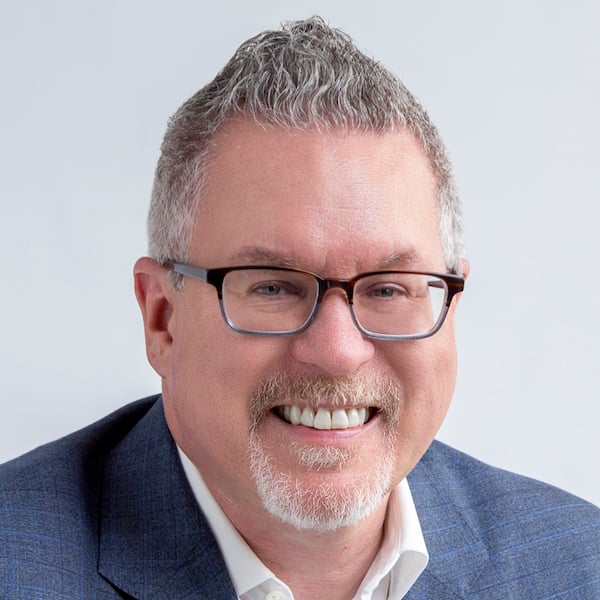
Written by Mark Graban
Mark Graban has served healthcare clients since 2005. Mark is internationally recognized as a leading author and speaker on Lean healthcare. His latest book is "The Mistakes That Make Us: Cultivating a Culture of Learning and Innovation."

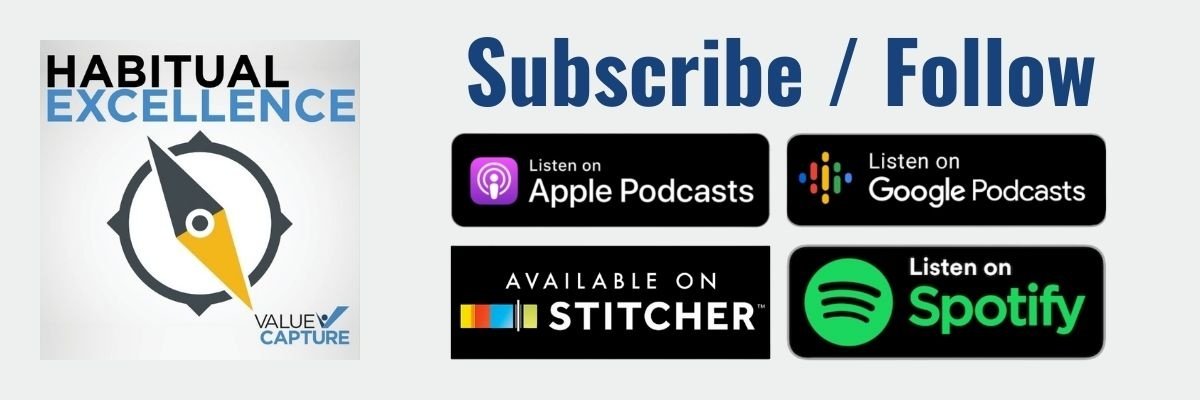
Submit a comment